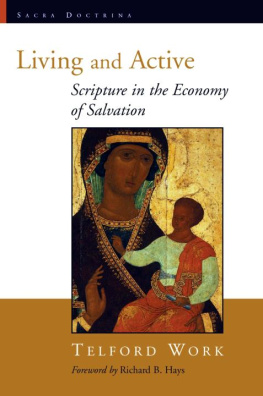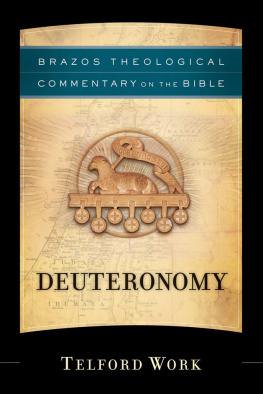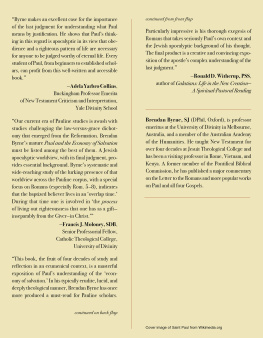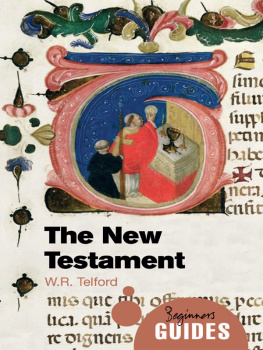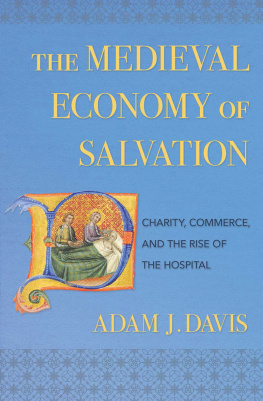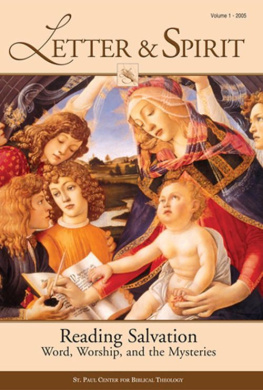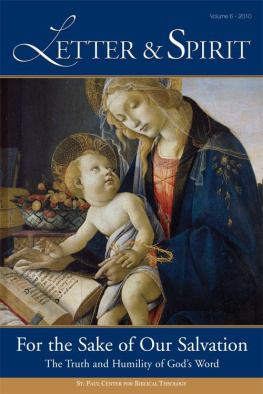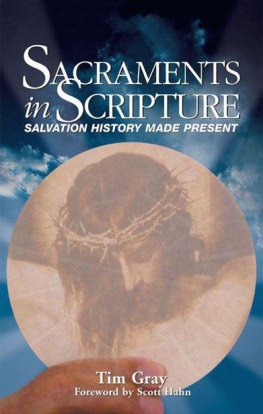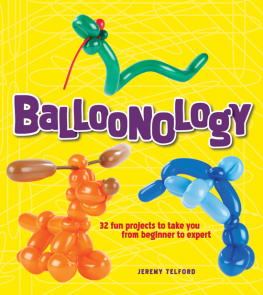Telford Work - Living And Active: Scripture in the Economy of Salvation (Sacra Doctrina)
Here you can read online Telford Work - Living And Active: Scripture in the Economy of Salvation (Sacra Doctrina) full text of the book (entire story) in english for free. Download pdf and epub, get meaning, cover and reviews about this ebook. year: 2010, genre: Religion. Description of the work, (preface) as well as reviews are available. Best literature library LitArk.com created for fans of good reading and offers a wide selection of genres:
Romance novel
Science fiction
Adventure
Detective
Science
History
Home and family
Prose
Art
Politics
Computer
Non-fiction
Religion
Business
Children
Humor
Choose a favorite category and find really read worthwhile books. Enjoy immersion in the world of imagination, feel the emotions of the characters or learn something new for yourself, make an fascinating discovery.
- Book:Living And Active: Scripture in the Economy of Salvation (Sacra Doctrina)
- Author:
- Genre:
- Year:2010
- Rating:5 / 5
- Favourites:Add to favourites
- Your mark:
- 100
- 1
- 2
- 3
- 4
- 5
Living And Active: Scripture in the Economy of Salvation (Sacra Doctrina): summary, description and annotation
We offer to read an annotation, description, summary or preface (depends on what the author of the book "Living And Active: Scripture in the Economy of Salvation (Sacra Doctrina)" wrote himself). If you haven't found the necessary information about the book — write in the comments, we will try to find it.
Living And Active: Scripture in the Economy of Salvation (Sacra Doctrina) — read online for free the complete book (whole text) full work
Below is the text of the book, divided by pages. System saving the place of the last page read, allows you to conveniently read the book "Living And Active: Scripture in the Economy of Salvation (Sacra Doctrina)" online for free, without having to search again every time where you left off. Put a bookmark, and you can go to the page where you finished reading at any time.
Font size:
Interval:
Bookmark:

Christian Theology for a Postmodern Age

GENERAL EDITOR
Alan G. Padgett, Azusa Pacific University
EDITORIAL BOARD
Sally Bruyneel, University of Durham
Young Ho Chun, St. Paul School of Theology
Gabriel Fackre, Andover Newton Theological School
Justo Gonzales, Hispanic Theological Initiative
S. Mark Heim, Andover Newton Theological School
Patrick Keifert, Luther Seminary
Anne King-Lenzmeier, University of St. Thomas
Anselm Kyongsuk Min, Claremont School of Theology
Michel Najim, St. Nicholas Orthodox Christian Church
William Placher, Wabash College
J. Randy Sachs, Weston Jesuit School of Theology
Robert J. Schreiter, Catholic Theological Union
John Stackhouse, Regent College
Anthony Ugolnik, Franklin and Marshall College
TELFORD WORK
To the disciples at Christian Assembly and Westmont College who, in using Scripture, show that you know intuitively what I have found myself struggling here to put in analytical language. You say more in inflecting one verse than I can write in an entire book.
xiii
xix
Telford Work's Living and Active is a book of signal importance for the church's theological reflection about Scripture. To explain the reasons for this judgment, it will be useful to sketch - begging the reader's indulgence - a bit of my own intellectual pilgrimage in grappling with the role of the Bible in Christian theology.
One apologetic strategy I encountered, especially among evangelical writers, was to argue for the authority of Scripture by citing isolated Bible verses. Even apart from the disconcerting logical circularity of such arguments, they fail the test of careful exegesis. Scriptural passages (such as Isa. 55:11, 1 Thess. 2:13, and Heb. 4:12) that refer to "the word of God" are not speaking - at least not in any simple sense - of the canonical text of the Bi Therefore, to invoke these texts in defense of biblical authority entails an act of unacknowledged special pleading, a theological sleight of hand that transmutes statements about the prophetically proclaimed word into doctrines about the subsequently canonized text of the Bible.
Even 2 Tim. 3:16, the cornerstone of many arguments for the authority of the Bible - while it does refer explicitly to "scripture" - will not support the weight of the claims that have often been constructed upon it. The Greek syntax of the sentence favors the translation "Every scripture inspired by God is also useful ..." (as in the NRSV footnote) rather than "All scripture is inspired by God and useful...." Thus, contrary to the way the verse has often been understood, the text does not categorically assert that all scripture is inspired. Furthermore, the sentence does not say that Scripture is inerrant or even that it is authoritative on all theological questions. Rather, the passage makes a more modest and sturdy affirmation: that every inspired text is "useful for teaching, for reproof, for correction, and for training in righteousness." In other words, Scripture, according to 2 Tim. 3:16, is edifying for the purpose of moral instruction. One might grant this claim but still wonder whether (or how) the text informs theological reflection about the character of God or about christology or eschatology or other theological topics. Finally, and most significantly, when the author of 2 Timothy uses the term "scripture;" he is certainly referring to the Old Testament, not the canonical New Testament, which was of course not yet in existence when this letter was written.
In sum, the attempt to buttress the authority of the Bible by prooftexting proves to be theologically vapid and unsatisfactory. Perhaps sensing this unsatisfactoriness, some defenders of biblical authority have appealed to a very different sort of argument, attempting to demonstrate the factual truthfulness of Scripture. The Bible, according to this line of argument, is true because it can be shown to be historically reliable. This project, however, is even more fatally flawed than the prooftexting method, for two reasons. First, it must expend vast energies seeking to explain away internal tensions and contradictions within the biblical narratives. It violently subordinates the untidy particularity of the Scripture we have actually been given to a theoretical ideal of what sort of Scripture God ought to have given us. Second, and equally Thus, ironically, some of the staunchest defenders of biblical inerrancy are actually captive to modernist, Enlightenment conceptions of truth and authority.
This epistemological revolution, which laid the groundwork for all my subsequent work as a New Testament scholar, has characterized the theological movement that is often called postliberalism. Understanding biblical authority within this model allows us to respect the narrative character of the scriptural witness, and to acknowledge its truth claims, without falling into the characteristic conundrums and rationalistic fallacies of fundamentalism.
On the other hand, other critics protest, on quite a different front, that On this view, the authority of the Bible is rooted in the church's conventions of reading.
Against this background, the significance of Telford Work's book comes into focus. He has offered us a fresh systematic account of the Christian doctrine of Scripture - "bibliology, as he calls it. This theological reflection is light-years ahead of the usual evangelical apologetics for the authority of the Bible. Rather than falling into fruitless patterns of prooftexting or rationalistic defense, Work has undertaken a constructive theological reflection about "the Bible's relationship with God and its role in God's plan of salvation" (p. 9). Building on the incarnational theology of Athanasius, Work mounts a case for understanding the Bible as a direct manifestation of "the Word's selfinvolvement in the world." The result is a bold and nuanced account of the Bible as the triune God's instrument of self-revelation.
Although this book was originally written as a dissertation at Duke, under the discerning direction of my colleague Geoffrey Wainwright, it transcends the dissertation genre. Indeed, it is a major piece of constructive theology. Work writes with confidence, depth, and theological maturity, showing how the revelatory function of Scripture is grounded in the trinitarian character of God.
Readers of the book will perceive that Work's account of the Bible's role in "the economy of salvation" avoids the two pitfalls of postliberalism as outlined above. First, he forcefully asserts that Scripture is an instrument of the living God's activity in the world, ensuring that it cannot be understood merely as a self-enclosed, self-referential literary text. Second, Work's vigorous engagement with the church's confessional traditions ensures that his claims about Scripture as the medium of God's self-disclosure are imbedded in sustained dialogue with the ecclesiologies of various catholic Christian traditions, ranging from Athanasius and Augustine to Barth and von Balthasar. His illuminating comparison of recent battles over biblical authority to the Iconoclastic controversy of the eighth century - including his suggestion that the Seventh Ecumenical Council's understanding of icons provides an analogy for our understanding of Scripture as an instrument of God's action - exemplifies the deep ways in which Work's constructive proposals are consciously grounded in ecclesial tradition. (This aspect of Work's project is particularly interesting since he comes from a background in one of the "new paradigm" postdenominational churches. He could be the first major ecumenical systematic theologian emerging from this new movement; at least, he is the first known to me.) By any measure, this is a remarkable piece of theological work, and it should become a benchmark for subsequent discussion of Scripture's role in the church.
Font size:
Interval:
Bookmark:
Similar books «Living And Active: Scripture in the Economy of Salvation (Sacra Doctrina)»
Look at similar books to Living And Active: Scripture in the Economy of Salvation (Sacra Doctrina). We have selected literature similar in name and meaning in the hope of providing readers with more options to find new, interesting, not yet read works.
Discussion, reviews of the book Living And Active: Scripture in the Economy of Salvation (Sacra Doctrina) and just readers' own opinions. Leave your comments, write what you think about the work, its meaning or the main characters. Specify what exactly you liked and what you didn't like, and why you think so.

